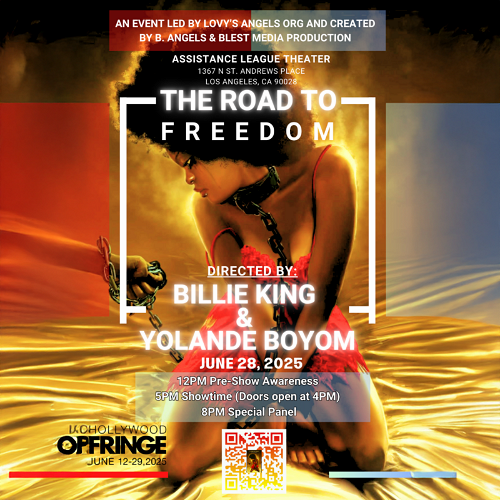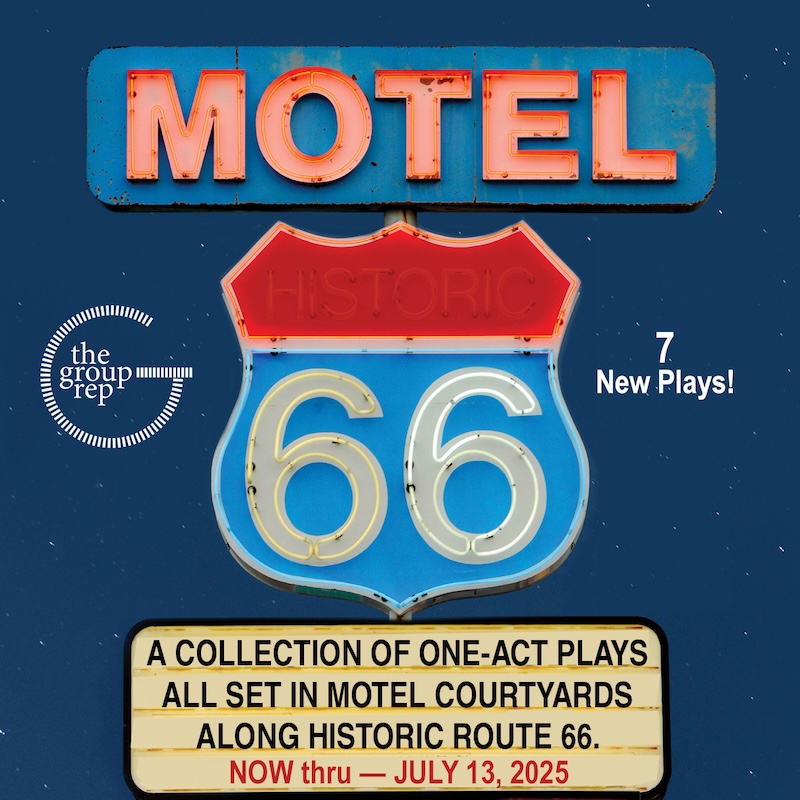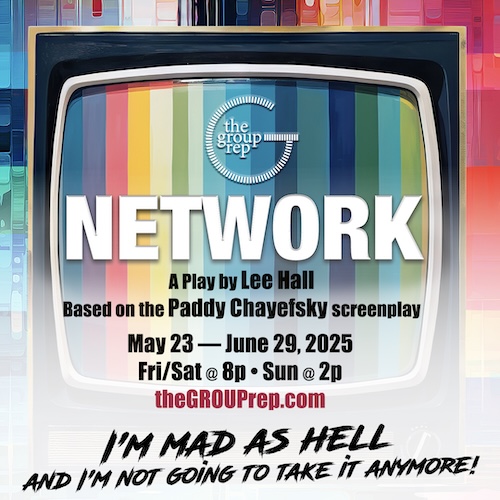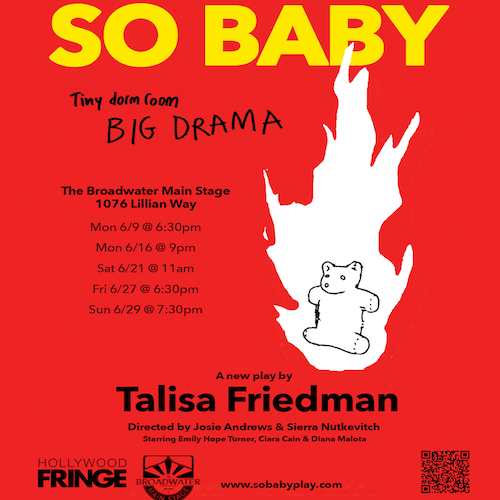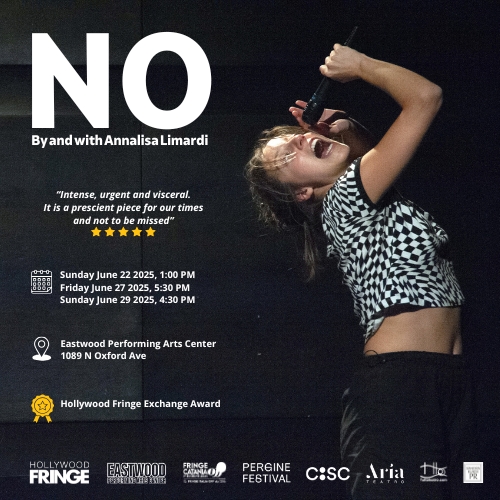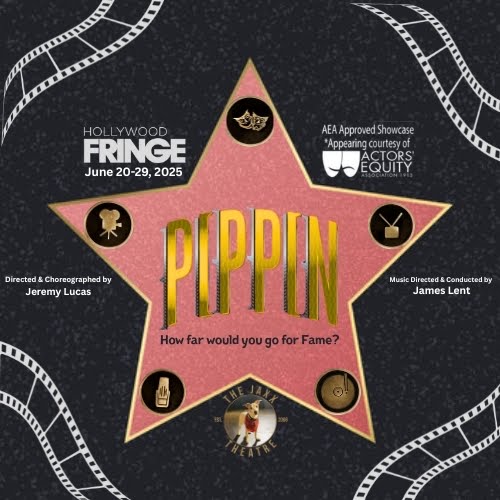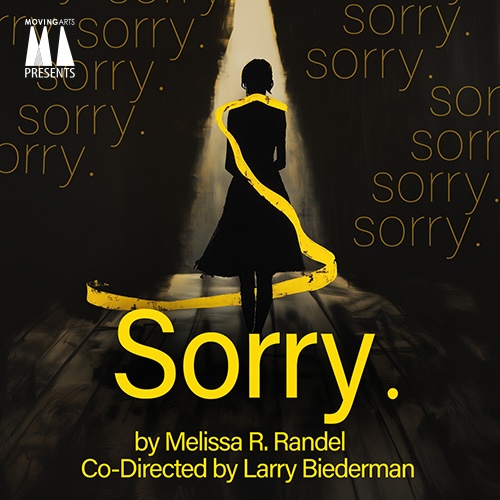Hugo Armstrong Transforms Chekhov’s Uncle Vanya
Michael Michetti’s standout production
By Steven Leigh Morris
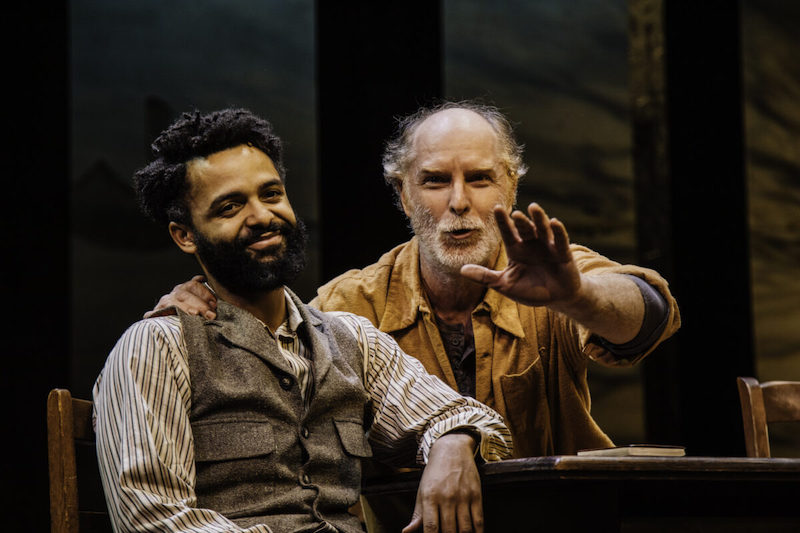
Brandon Mendez Homer’s Dr. Astrov, and Hugo Armstrong as Uncle Vanya (Photo by Jeff Lorch)
______________________________________________
Michetti’s staging of Uncle Vanya at the Pasadena Playhouse is the best production of Vanya since Louis Malle’s 1994 movie of the play (Vanya on 42nd Street)
______________________________________________
Having been largely weaned on the plays of Anton Chekhov, and his turn of the 20th century mingling of regret and humor while something, always something, is ending (Chekhov wrote as the Russian Revolution was brewing), I admit to a trepidation in seeing productions of plays by the Russian literary giant, because they so rarely rise to their complex occasion. They’re usually suffocated by affectation of some kind – such as an obsequious devotion to kitchen sink realism, and samovars and wicker furniture, or, in American or British hands, an effort to invent what it means to be Russian in 1899; that rarely turns out well.
Anton Chekhov has a subway station named after him in Moscow, though an entire generation of Russians, let alone Americans, hardly knows who he is anymore. Ironically, that’s precisely what he writes about, and writes about directly in his 1899 play Uncle Vanya, adapted from an earlier script, The Wood Demon. The steady slide from celebrity, or any kind of contrived importance, back to a kind of dust in an ether when almost nobody remembers who we were or what we did — it’s part of a quasi-tragic joke.
I’d like to personally thank director Michael Michetti for sweepingly avoiding every pitfall that generally curses American/Brit productions of Chekhov. Michetti’s staging of Uncle Vanya at the Pasadena Playhouse is the best production of Vanya since Louis Malle’s 1994 movie of the play (Vanya on 42nd Street) — really a filming of the play being rehearsed, based on a production directed by Andre Gregory and starring Wallace Shawn. In many ways, Michetti’s rendition surpasses it.
The Wood Demon/Uncle Vanya is the first play in modern literature to grapple head-on with climate change. In that regard, it has grown increasingly relevant to our times, and now its pertinence is as devastating as it is revelatory.
A local bachelor and country doctor named Astrov (Brandon Mendez Homer) plants trees as an avocation, seeing a sapling and imagining it swaying in the breeze after a hundred years. In fact, he chronicles the flora and fauna of his local forest with charts and illustrations, detailing to the married woman Elena (Chelsea Yakura-Kurtz), for whom he lusts, the steady erosion of the landscape over the decades. Elena is bored by his presentation, thinking at the time only of the love life of her unmarried stepsister, Sonya (Sabina Zúñiga Varela), and how Elena might serve as matchmaker between Astrov and her.
Welcome, then, to our soap opera culture, with its cults of celebrity, its apathy and petty diversions all contributing to the decay which leads to the kind of destruction that now threatens all of us. (To deflate Astrov’s prescience for a moment, he also argues that had the forest been decimated in the service of cities and culture and commerce, all would be well. Well, that’s largely what has happened globally, and all isn’t well.)
Yet there are other aspects of Michetti’s staging that bring out how vividly this quaint Russian play speaks quite specifically to the United States in the 21st century. Another of Astrov’s complaints — he has multitudes — is the myopic stupidity and self-importance of those who are educated, and the ignorance of those who are not. The crisis of the title character (Hugo Armstrong) — Uncle Vanya is an educated man — is, frankly, the terror of being disregarded and even replaced (certainly in his love life), which leads directly to him pulling out a gun and firing almost indiscriminately, though aiming for the master of the house — a washed-up academic (Brian George) for whom Vanya has dedicated so much of his labor. The violence is triggered in part by a single insult: The aging academic calls Vanya a “non-entity.”
But this is all in the play itself. It always was. How is it that Michetti’s production drives it home so directly to our cultural moment?
First, he airlifts Uncle Vanya out of Russia in general and the Moscow Art Theatre in particular. True, the names and some references remain Russian. But in place of samovars and wicker furniture and Gjhel pottery and 19th century posturing, Tesshi Nakagawa’s set (blending surprisingly with this historic theater’s Spanish colonial architecture) turns the stage into a kind of crypt, with looming black oblong pillars. The stage floor consists of planked platforms; the furniture, bar none, is heavy wood: that includes dining table, buffet and side tables. Two gothic chandeliers hang overhead. Yes, Dorothy, we’re not in Russia anymore. We’re nowhere. We’re everywhere.
When asked to describe the character of Astrov, Chekhov once replied cryptically, “He wears a silk necktie,” meaning that even while riding on horseback along muddy roads and ditches, he clings to absurd protocols of dress. Not so here. Though Wendell C. Carmichael’s costumes are vaguely period and regional, they traffic in a kind of non-specificity that permits the play itself to transcend. By play’s end, Vanya — decidedly deranged, with spikes of hair splaying out like grass — wears a grubby, collarless shirt and trousers stained at the knees with dirt. This would be impermissible in turn-of-the century Russia, even on this country estate where the play is set.
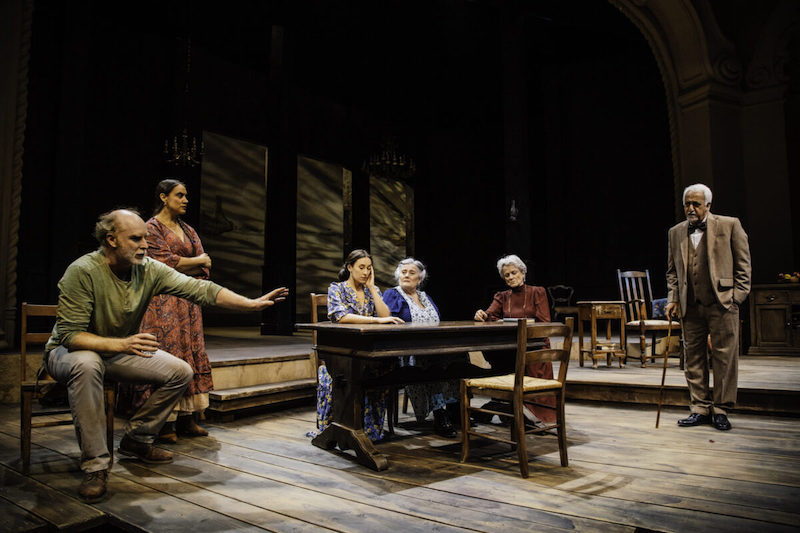
The ensemble of UNCLE VANYA (Photo by Jeff Lorch)
______________________________________________
At one point, a line simply disappeared mid-utterance. While he bent forward over the dining room table, the line vaporized into a grunt emitted from the bone marrow.
______________________________________________
Instead, Michetti’s production — and Hugo Armstrong’s Vanya in particular — transforms the milieu into a play by Tracy Letts or Sam Shepard. There are times Armstrong seems to have transported himself into a production of August, Osage County, or True West. And it’s weirdly perfect.
Armstrong is a highly regarded local actor and he never fails to impress. But his performance in this role is something of a completely different order. For those who know the play, Vanya’s lines have a kind of perfunctory rhythm that Armstrong sometimes inverses and punctuates with groans and injections of playful mockery.
At one point, a line simply disappeared mid-utterance. While he bent forward over the dining room table, the line vaporized into a grunt emitted from the bone marrow.
In a single performance, through physical and vocal contortions, Armstrong has created a lunatic and a child, swooning from regret for where his life has landed him, for the ditch in which his various loves have landed him: infantile, terrorizing, terrifying and, through all of that, utterly endearing — from a distance. Not sure I’d want to grab a burger with his Vanya, this loping, frayed nerve. That’s what the word “electrifying” was meant to convey. He brings this play to life in a way that I, at least, have never seen it, and it’s a treasure.
Armstrong receives solid support from the ensemble. If Armstrong transports Uncle Vanya to the American Southwest or some Oklahoma plain, Ann Gee Byrd’s Marya (Vanya’s pinch-lipped mother) and Jayne Taini’s world-weary maid rope it back in with what might be called turn-of-the-century Russian decorum. Varela’s “plain” Sonya — who opens the play and provides a couple of scene transitions with a plaintive ballad accompanied by herself on guitar — brings salt-of-the-earth compassion to her own, and everybody else’s, misery. (It wouldn’t be a Russian play if everyone weren’t miserable.)
I couldn’t quite get a handle on Homer’s Dr. Astrov, nor on Yakura-Kurtz’s languid, languishing Elena (the old scholar’s young, second wife), both proficient, authentic performances, but not yet on fire. (Yakura-Kurtz just stepped into the role, which would explain the fierce intelligence yet boxed-in essence of the character; possibly, probably, more nuances will evolve through the production’s run.) Brian George brings a measured wit to the aging scholar Serebryakov’s unwitting emotional sadism.
This version is translated by Richard Nelson, Richard Pevear, and Larissa Volokhonsky. One exchange, in which Vanya mocks Serebryakov’s endless, pointless writings, usually reads as, “I feel sorry for the paper he writes on.” Here, it comes out as, “Poor paper.” With that kind of economy, you know they’re doing the play a service.
In the world of modern lit, this is an old play, a chestnut about old people. A comedy about mortality and the end of things. This company has turned it into something new.
UNCLE VANYA | By Anton Chekhov | Pasadena Playhouse, El Molino Ave., Pasadena | Wed.-Fri., 8 pm; Sat., 2 & 8 pm; Sun., 2 & 7 pm; thru June 26. https://pasadenaplayhouse.org Running time: Two hours and 45 minutes with one intermission.




